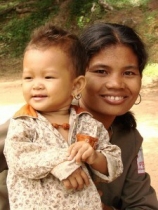
Photo credit: Mother and Child by Adam Jones, Ph.D.
Paternity tests are no longer just the subject of Jerry Springer white-trash throw-downs; they’re now a tool to help child trafficking survivors. Children who have been trafficked or abandoned at very young ages often don’t have the answer to the most basic question: where did I come from? Now, the Life Technologies Foundation has funded research to use DNA testing to help reunite families torn apart by trafficking.
Kids are torn from their families in a number of ways: they are kidnapped, their parents are tricked, they are abandoned, and in a few cases they run away. Often, the children are young enough when they are removed from their families that they have no idea of their last name, the name of their home town or village, and how old they are. When these children are identified and removed from slavery by NGOs and law enforcement, the best option is usually to return them home. However, when no one, not even the child, knows where home is, that option often can’t be used.
The DNA-PROKIDS Project is headed up by Dr. Jose Lorente and Arthur Eisenberg, and will use the $500,000 award from Life Technologies Foundation to create DNA collection kits, hire staff to help coordinate international efforts and process DNA samples, and to encourage more international collaboration through education and networking. DNA-PROKIDS has been around since 2000 in smaller forms conducting pilot work. In 2006, the team tested a group of kids orphanages and adoption centers in Mexico and Guatemala. They made 200 matches of children to parents who had not given their child away willingly, but had their child kidnapped or been tricked into giving their child to a trafficker.
DNA testing is a fantastic tool for parents who have had children stolen or who have otherwise lost children to try and get them back. It’s also a great way for NGOs who identify trafficked children to try and reunite them with their biological families. I can guess, however, that the biggest challenge with the project will be helping people understand how DNA testing works and feel empowered to give a DNA sample. Child trafficking operations are so entrenched in some communities, and losing a child to traffickers is so common and experience, that parents may not feel like DNA testing can do anything to help reunite them with their child. The public awareness component of such an undertaking will be possibly more challenging than the scientific components.
This is a cool project, and I’m excited to see where it goes. It’s also a creative solution to an issue that has plagued child trafficking organizations for years: how do you reunite a child with a family he has no memories of? Perhaps DNA testing will allow more parents who have lost children an opportunity to get them back.
By Amanda Kloer
Source: mgjack.wordpress.com






